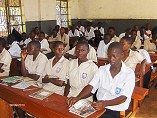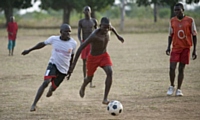Life, Education and Religion in Uganda
It is impossible for anyone, let alone a foreigner, to describe the typical life in a country in a few sentences. Nevertheless, it can be helpful for new volunteers to have some ideas before arriving, so as to be ready for ‘the culture shock’. This brief snapshot concentrates on the contrast between the West and Uganda, looking especially at differences caused by poverty and underdevelopment. Do not, however, think that life for Ugandans is miserable and depressing. On the contrary the people are good-humoured, happy and easy-going. They love to chat, dance and joke and are very proud of their young country. Western visitors now see dramatic contrasts between the standard of living in their own country and that of Uganda, but look back a few generations and you will see great similarities – we are simply at different stages of economic development.
The majority of people in Jinja and Buswale are poor –they can hardly imagine having the standard of living and the possessions enjoyed by Westerners. Yet when you look carefully you will see amazing happiness in spite of the poverty, which is very humbling. Look and learn – though we hope that the lives of the people we serve will benefit from our work, it is likely that the lives of volunteers will be enriched far more. Our objective is to share in the task of development - sustainable development - that rejects dependency and leads to self- sufficiency.
Uganda has a very high birthrate – among the top ten in the world. Traditionally, tribes and clans encouraged their members to have children and you will quickly notice an almost universal affection for youngsters. Families with 10 or more children are quite normal though there are some signs of change. Additionally, the country’s tradition allowed men to have more than one wife, meaning that some families can be very large. Children can start primary school at 6 years old though some go later if families can’t afford to send them. Uganda introduced Universal Primary Education (UP a number of years ago. The aim was to make education available to all children however poor but most schools have to charge fees because support from the government is small, though they do pay teachers’ salaries. Practically all schools require students to have a uniform, pay for exercise books, pens and pencils, pay for their porridge lunch and contribute something to the school development fund. Some schools ask that each student bring rolls of toilet paper, a brush, perhaps a ream of photocopy paper, and razor blades for sharpening pencils. Poor families with a number of children can find these costs very demanding – most families, even those with a relatively good income say that school fees are their biggest worry.
Though you will see some really beautiful houses in Uganda, these are not typical. Many houses in the countryside are round mud and pole structures thatched with grass. In recent years there has been a ‘building boom’, so that brick houses roofed with corrugated iron sheets have taken over from the traditional mud structures. A ‘house’ often refers to just one room in a building and although the room may be quite small the family sleeps, sits and bathes in this space as well as storing all their clothes and possessions. Cooking is usually done outside on the terrace or in a kitchen, separate from the house – these kitchens are very basic. Few have a tap inside. If they have a source of piped water, the tap will be outside, while most go to a borehole and fetch water. In towns, and increasingly in villages, people have to pay for their water – about 4cents for 20 litres.
In towns and at schools there will be toilet and wash facilities, but these will normally be far more basic than in the West. Be ready to change your idea of a ‘shower’. Local showers (if a structure exists) are bare brick and cement. You take a bowl of water, a jug and your soap into the cubicle, stand in the bowl and pour jugs of water over yourself until you are clean. In rural areas you don’t have the luxury of privacy – you must ‘shower’ outside and hope that no passer-by sees you! However, the volunteer house in Buswale has real running water showers and flush toilets – you will be spoiled! It is amazing to see how clean and smart the people look in spite of the very basic facilities in their homes.
Washing clothes is done by hand – I have only once witnessed a washing machine in Uganda. Three bowls of water, washing powder or soap and an incredible amount of energy and skill result in very clean clothes. Children are trained from an early age to wash their own clothes. This job and the collection of firewood and fetching of water are important duties for the children. Youths of about 13 yrs will carry one or two 20 litre jerry cans, while the younger ones help by fetching smaller containers of 5 litres. Households with a bike carry 4 or 5 jerry cans on it.
In the countryside, most people walk bare-footed. Even if they own shoes, many will carry them until they reach their destination in order to keep them clean. Football is also played in bare feet though playing for the school team may require boots. It can be very amusing to watch a group of youngsters playing on a field around the grazing cows – Wayne Rooney never has to endure problems like this.
School fees are perhaps the biggest worry for families in Africa – limited income often means that the family can only educate some of the children, while the rest receive either no schooling or a limited number of years at school.
We as volunteers can have little impact on this situation though we should certainly be aware of it. However, it is our wish, if opportunities arise, to help communities in whatever way possible to improve agriculture and small business, so that families can more easily afford education. It is our belief that simply giving, without careful consideration can hold back development by creating dependency. Africa has received billions of dollars in aid over the past few decades but progress in development has been disappointing. At independence, Uganda had an economy on the same level as Singapore and India but is now a long way behind. Could it be that the aid donor countries have provided has hindered the development process? You may well be asked by local people to give help with school fees, medical costs and a whole variety of other needs. Think carefully before you give. Be sure that any help has a reasonable chance of leading to sustainable progress, rather than more dependency.
Be ready to adapt your ideas to the local circumstances. Remember that Uganda is still in the early stages of development and has only been independent for just over 50 years. Things which Westerners take for granted – like eating 3 meals a day, drinking a soda or beer, having a football, bike or computer – are outside most Ugandan’s experience. They exist on a mainly carbohydrate diet of posho or millet bread, sweet potatoes and cassava, perhaps rice or matooke (savoury bananas) for special occasions, with beans or cowpeas as their main source of protein. Meat and fish are a very special treat which many will experience only at Christmas, Easter or a special occasion. Though some men may regularly enjoy the local beer (marua) which is sucked through long tubes from a communal bucket, drinking commercially produced beers and soft drinks is a rare treat for those without a well-paid job (there is over 70% unemployment in the country). Even if someone is fortunate enough to have work, they may only be earning UGS 80,000 (£20) per month.
Computers, cameras, music systems, expensive mobiles and designer clothes are beyond the reach of most people. Be conscious of this for the security of your possessions and in order not to put temptation into the path of local people.
Uganda’s Education System
The education system is similar to the English system, with 7 years in primary education, 4 in lower secondary up to ‘O’ levels and finally 2 years for ‘A’ levels. Many pupils will be older than their counterparts in England for various reasons such as late starting age, repeating a class, or missing years because parents can’t afford fees, uniform or books. Uganda introduced UPE ‘Universal Primary Education’ a number of years ago and more recently USE ‘Universal Secondary Education’ The government wishes to ensure an education for every child, regardless of family income, but the available funds are limited, so invariably parents have to pay something and though the sums may seem small to Westerners, poor families can find it impossible to pay them as well as providing equipment and uniform for their children, especially when they have a big family. The result is that children ‘take turns’ in attending school. It isn’t unusual to find 16 and 17 yr olds still at primary school.
The ‘official’ language in Uganda is English, but to most children it remains a foreign language. In rural areas, the only time they hear or speak English is at school. Though the official policy states that all tuition after Primary 3 should be in English, teachers, desperate to make students understand, often use the local language in lessons. The problem with this practice is that all books and lesson notes are in English, as are all examinations. Students who don’t master English are doomed to failure.
Religion in Uganda
In Europe and America, most organisations are strictly secular – so that any participant knows that their religious or non-religious views will be regarded as private – indeed, discussion of religious affiliation, in western workplaces, is almost taboo. In contrast, many African countries are very religious, and no meeting takes place without a prayer being offered to God. Uganda, unlike many other states, is very tolerant of different religious practice and it is not uncommon to find families where members follow different faiths.
The school set up in Uganda sometimes confuses people. Denominational schools do not exist, in the sense that entry to a school is dependent on a particular faith. Schools accept students of all faiths and denominations and acceptance and respect for different faiths is the norm. The name ‘Catholic’, ‘Anglican’, or ‘Muslim’ attached to the school refers to the founders of that school. The founding body appoints the head teacher and the ethos of the school reflects the founding religion. However, volunteers need not be worried that they will face intolerance because of their belief or non-belief. They will be accepted and welcomed wholeheartedly. Obviously, volunteers must extend that same tolerance and respect to the community with which they are working. Respect for the cultural values and beliefs of the host community is essential in the work of the project.

